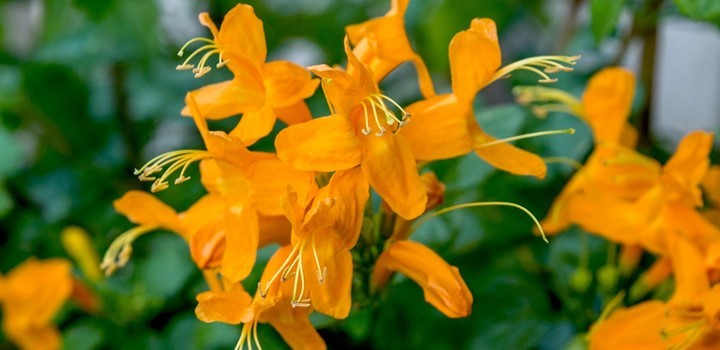Springtime without blooming honeysuckles is quite offbeat. Likewise, blooms in a weak honeysuckle vine are not desired either. Both of them are leading symptoms of nutrient deficiency. And that’s when you look for an ideal fertilizer.
But not all fertilizer is appropriate for perfect growing & blooming together. So the question- What is the perfect fertilizer for Honeysuckles?
Briefly, Honeysuckles love instant food during its growing season. But to keep the vine strong, slow-release of nitrogen is desirable. So, any organic or inorganic fertilizer that serves these requirements is the perfect one.
Good news- in this article, I have reviewed the 6 best fertilizers for any types of honeysuckles like Scarlet Honeysuckles, Japanese Honeysuckle, Cool Splash Honeysuckles, Cape Honeysuckles, Winter Honeysuckles & so on.
I believe, before purchasing, you must go through these six fertilizers to get the right one. So, let’s check them out-
Top 6 Fertilizer For Honeysuckle- Comparisons
| Fertilizer | NPK | Form | Type | Price |
|---|---|---|---|---|
| Nelson Plant Food For All Flowering Vines | 17-7-10 | Granular | Synthetic | |
| Espoma Plant-tone Food | 5-3-3 | Granular | Organic | |
| Miracle-Gro Water Soluble Plant Food | 24-8-16 | Granular | Synthetic | |
| JR Peter Jack Classic All Purpose Plant Food | 20-20-20 | Granular | Synthetic | |
| Miracle-Gro SHake ‘N Feed Plant Food | 12-4-8 | Granular | Semi Organic | |
| Dr. Earth Tomato,Herb Fertilizer | 4-6-3 | Granular | Organic |
Top 6 Fertilizer For Honeysuckle- Reviews
1. Nelson Plant Food For All Flowering Vines
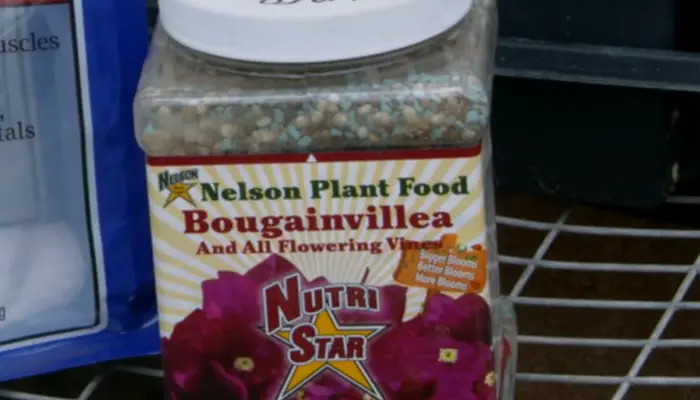
Nelson NutriStar products are designed to work with the soil. It gives your Honeysuckles the best nutrition at the right time and in the right amount. Let’s see what this plant food supplies-
Nutrient Composition
The NPK ratio of the fertilizer is 17-7-10. That means it contains 17% Nitrogen, 7% Phosphorus & 10% Potassium.
You know, like all vines, honeysuckles need other macro & micronutrients apart from N, P & K. Interestingly, the fertilizer supplies 6 more nutrients to keep your honeysuckles healthy. These are-
Macronutrients (required in higher amounts) – 0.80% Magnesium, 9% Sulfur & Micronutrients (required in lower amounts) – 0.05% Copper, 2.00% Iron, 0.15% Manganese & 0.20% Zinc.
And for your concern, all these nutrients are obtained from safe inorganic sources like ureaform, mono ammonium phosphate, mono ammonium sulfate, potassium sulfate, urea, etc.
Nutrient Analysis
Nelson plant food uses Nitrogen from four sources (3.44% Ammoniacal Nitrogen, 5.18% Urea Nitrogen, 1.73% slowly available water-soluble Nitrogen & 6.65% water-insoluble Nitrogen) to blend this fertilizer. You may ask, why?
Because ammoniacal & urea nitrogen ensures immediate supply of Nitrogen to your Honeysuckle. On the other hand, water-insoluble nitrogen releases the nutrient much slower than slowly available water-soluble nitrogen. Thus the fertilizer ensures long-term N supply to the Honeysuckle.
Besides this, the fertilizer contains combined sulfur which secures an instant supply of it too.
Such nutrient composition seems quite effective as after using this, most of the users got maximized quantity, color & size of Honeysuckle blooms along with improved vine growth.
Special Features
“Bigger blooms, Better blooms, More blooms”- this is what Nelson plant food guarantees for your Honeysuckles.
However, one of the Unique features of this fertilizer is it includes Epsom Salt- a widely used material for blushing blooms & green vines.
Applying Procedure
To feed your 14″ potted Honeysuckle, sprinkle 2 tablespoons of those colorful granules over the soil & then water thoroughly. For more details, check the product label.
2. Espoma Plant-tone All Purpose Plant Food
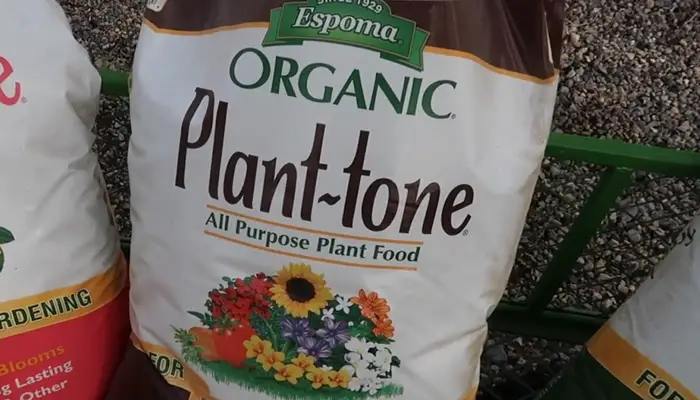
Some fertilizers both supply nutrients & improve the soil structure with a longer-lasting effect. Espoma Plant-tone is one of them.
Additionally, its worldwide use ensures its efficiency & popularity.
Nutrient Composition
Espoma plant-tone relied on natural & organic sources for the derivation of nutrients. Such as feather meal, bone meal, poultry manure, alfalfa meal, greensand, sulfate of potash & sulfate of potash magnesia.
The fertilizer maintains a 5-3-3 NPK ratio. Including N, P & K, it also carries 5% calcium, 1% magnesium & 1% sulfur.
The good news is- though the company hasn’t declared, my deep research indicates the presence of iron, manganese, copper, zinc, chlorine, boron & molybdenum too.
So, with such nutrient composition, it seems the best organic fertilizer for Honeysuckles to me. What do you think?
Nutrient Analysis
Among 5% of the Nitrogen, 3% of it is water-insoluble & the rest is water-soluble. So your honeysuckles get both instant & long-lasting nitrogen supply for vigorous growth.
As Honeysuckles require fertilization only once or twice during the growing season, an instant phosphorus supply is quite efficient for abundant blooms.
Special Features
Apart from Honeysuckles, this all-purpose fertilizer is suitable for all flowers, trees, vegetables & shrubs of your garden.
Your honeysuckles will love it for several special features. Such as- This plant tone contains 1% humic acid to improve staff like nutrient uptake, microbial activity, soil aeration, root growth, drought toleration, etc.
Additionally, its unique BIO-TONE formula is a blessing. Why?
You know, BIO-TONE is composed of biostimulants, beneficial bacteria, & mycorrhizae. It helps Honeysuckles to establish fast, opposes stress, encourages deeper roots & better blooms.
Applying Procedure
The exact dose is- 4 teaspoons for a 12″ pot. Spread the fertilizer around the stem & mix with the soil. And finally, as always, don’t forget to water thoroughly.
3. Miracle-Gro Water Soluble All Purpose Plant Food
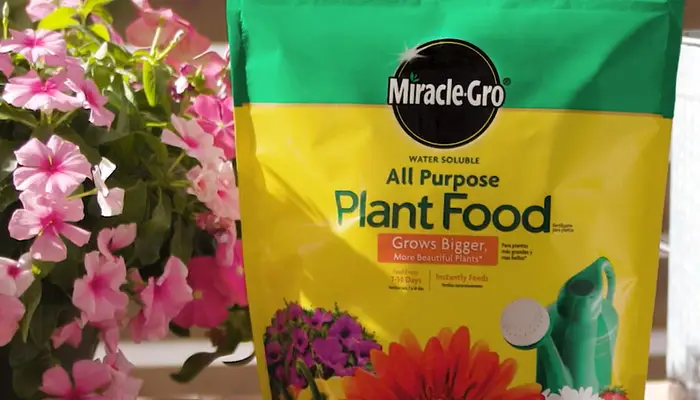
When you are hungry, you need instant food. Similarly, plants are no different. If you notice your Honeysuckle is weak or not blooming, this fertilizer is for you.
Nutrient Composition
No one looks for the ideal inorganic fertilizer for their Honeysuckles. Organic gardening is cool but enriched products do count, right?
Miracle-Gro comes up with an enriched nutrient composition. Along with 24% nitrogen, 8% phosphorus & 16% potassium, it contains essential micronutrients too. Such as-
0.02% boron, 0.07% copper, 0.15% iron, 0.05% manganese, 0.0005% molybdenum & 0.06% zinc.
And all these nutrients are derived from inorganic sources like ammonium sulfate, potassium chloride, potassium phosphate, iron EDTA, urea, etc.
Nutrient Analysis
Have you noticed that the NPK ratio of this fertilizer is pretty high from the previous two? But don’t get confused.
You know, it is a water-soluble fertilizer. So, it supplies nutrients instantly & within 7-14 days, it gets leached away by water. That’s why the nutrient composition is high to provide as much as possible.
Special Features
This plant food is very effective for Honeysuckles when they are actively growing. It ensures bigger & beautiful blooms. And apart from this, you can use it on other shrubs, vegetables, flowers, trees in your garden too.
An interesting fact is, this fertilizer carries chelated iron & manganese. In chelated form, nutrients remain linked with an organic chemical called chelate. And chelate keeps this nutrient available to get uptaken.
Applying Procedures
For potted honeysuckles, mix half teaspoon fertilizer with one gallon of water & drench the soil. The next due date is two weeks later.
4. JR Peters Jack’s Classic All-purpose water-soluble Plant Food
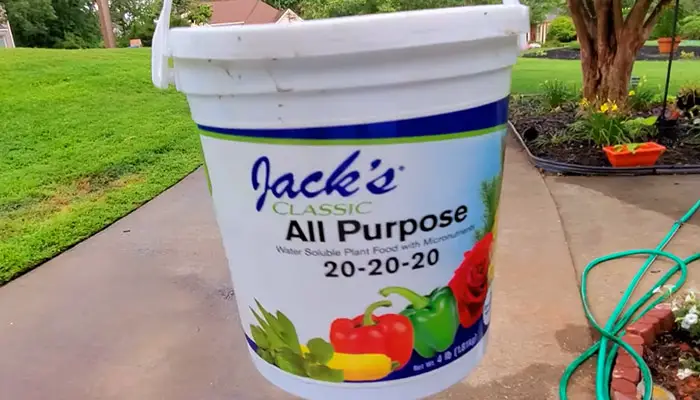
Here’s another instant feeder for your Honeysuckle. JR Peters plant food company is renowned for its high-quality water-soluble fertilizers. Let’s see what it is providing-
Nutrient Composition
The nutrients are from inorganic origins, for example- urea, monopotassium phosphate, potassium nitrate, boric acid, iron EDTA, etc. The NPK ratio of this fertilizer is 20-20-20.
Furthermore, to feed your Honeysuckle, the fertilizer carries 6 more micronutrients. They are- 0.02% boron, 0.05% copper, 0.10% iron, 0.05% manganese, 0.0009% molybdenum & 0.05% zinc.
Nutrient Analysis
You see, it is a balanced fertilizer as it bears an equal amount of nitrogen, phosphorus & potassium. Usually, growers use balanced fertilizers when they provide fertilizer once or twice a year to keep all the nutrients available in the exact amount. And that’s what Honeysuckles need.
Moreover, it supplies nutrients within a short time after applying as it is a water-soluble fertilizer.
Special Features
It is an all-purpose fertilizer. So, along with Honeysuckles, it will cover other flowers, turfs, vegetables & trees in your garden.
The best part is- the fertilizer feeds through both roots & leaves. So, the highest nutrient consumption is assured.
Besides, in this fertilizer, copper, iron, manganese & zinc is present in chelated form. Thus, the fertilizer guarantees proper nutrient availability.
Applying Features
Whenever you water your Honeysuckles, mix this fertilizer in a 1/4 teaspoon per gallon ratio.
5. Miracle-Gro Shake ‘N Feed All Purpose Plant Food
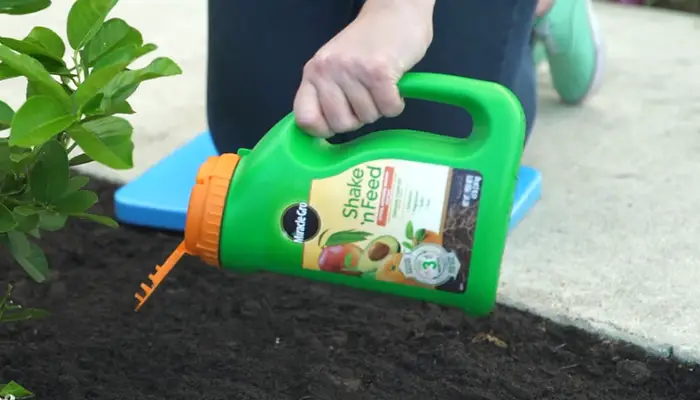
I have come up with another Miracle-Gro product. Miracle-Gro introduces it as “America’s Favorite Plant Food Maker.” Let’s check out the reasons behind this-
Nutrient Composition
The nutrient makeup is a bit surprising. Why?
Well, it is a semi-organic fertilizer as the nutrients are from both organic & inorganic sources. The sources are- urea, ammonium phosphate, feather meal, kelp meal, potassium sulfate, copper oxide, earthworm castings, zinc sulfate & so on.
However, the fertilizer contains both macronutrients & Micronutrients. For instance- Macronutrients- N (12%), P (4%), K (8%), Ca (7.6%), Mg (2.5%), S (3.2%) & Micronutrients- Cu (0.06%), Fe(0.95%), Mn(0.35%), Zn(0.02%).
Nutrient Analysis
All the nutrients of this fertilizer are water-soluble except for some parts of nitrogen. It contains 8.6% slow-release nitrogen obtained from polymer-coated urea & water-insoluble nitrogen from feather meal.
So, it ensures an instant supply of 10 macro & micronutrients & a long-term supply of nitrogen for up to 3 months. And that’s what makes this fertilizer the best slow-release fertilizer for Honeysuckles.
Special Features
This all-purpose plant food is suitable for all flowers, fruits, vegetables, shrubs & trees in your garden. But honeysuckles love it because it contains natural elements to feed beneficial soil microbes. Soil microbes break down organic matters & make nutrients available for the Honeysuckle.
And thus, the fertilizer looks after both below & above-ground portions. Isn’t it great?
Applying Procedure
Shake 3 tablespoons of fertilizer over the soil of a 10 inch pot & slightly work on it. Finish the fertilization by watering thoroughly.
6. Dr. Earth Organic Tomato, Vegetable & Herb Fertilizer
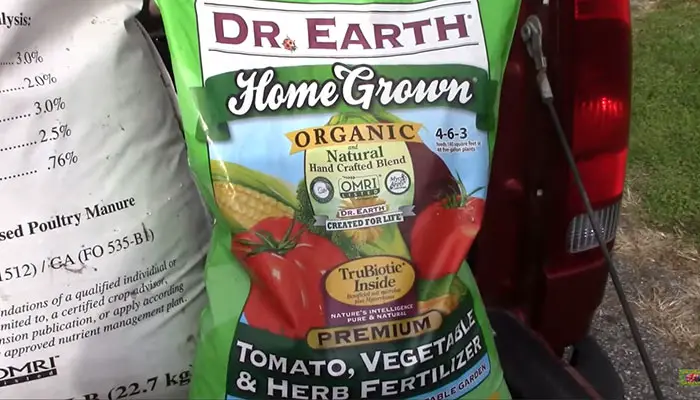
You might be thinking why I am suggesting a fertilizer that is mainly for vegetables, right?
Well, it doesn’t matter what fertilizers we are using, only the nutrients matter. As long as it serves our honeysuckles requirement, it’s okay to use. More details-
Nutrient Composition
The fertilizer contains 4% N, 6% P, 3% K & 7.5% Ca from organic origins like fish bone meal, bone meal, feather meal, alfalfa meal, potassium sulfate, fish meal, kelp meal, rock phosphate & kelp flour.
It also adds other macro & micronutrients like magnesium, sodium, iron, manganese, copper, zinc, chlorine, boron & molybdenum to the soil.
Nutrient Analysis
All of the nitrogen in this fertilizer is water-insoluble. And the rest of it is water-soluble. So, like most others, it is also an instant & long-term feeder.
Moreover, the good news for organic gardeners as it is OMRI approved.
You know, flowering vines like Honeysuckles love phosphorus because it helps in elegant blooming. And the NPK ratio says this fertilizer contains more phosphorus than nitrogen & potassium.
Therefore, I think it is one of the best natural fertilizers for Honeysuckles.
Special Features
Dr. Earths’ products have some unique specialties. Such as-
The fertilizer contains TruBiotic, a broad-spectrum soil inoculant. It is a composition of beneficial microbes with mycorrhizae to keep your soil fertile.
Honeysuckles thrive in soils that are enriched in organic content. Interestingly, this fertilizer contains 6% humic acid that enriches the organic material of the soil. Besides, it also increases the nutrient uptake ability of Honeysuckles.
Applying Procedures
For potted Honeysuckles, sprinkle half a cup of fertilizer over 5 gallons of soil. After a little work, water thoroughly.
What Should Feed Honeysuckle?
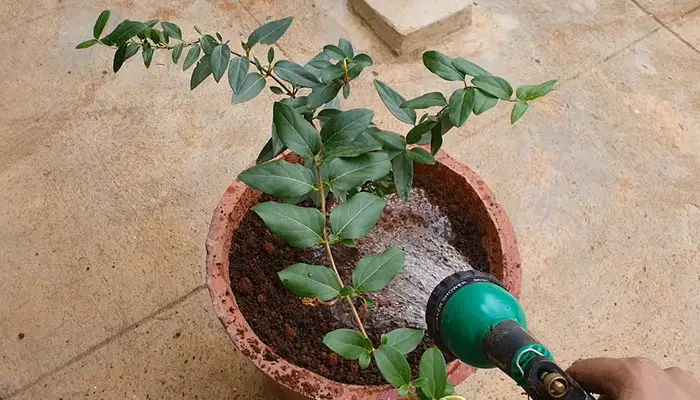
Interestingly, in the case of feeding, Honeysuckles don’t have any special needs. As it is a vine, it requires a little more nitrogen for a structured stem. On the other hand, too much nitrogen may boost the vine growth profoundly & reduce blooming.
Along with other nutrients, a decent amount of phosphorus & potassium is needed for proper blooming & internal enzyme activity.
Keeping all that in mind, you can go for all-purpose or balanced fertilizer that ensures both instant feeding of nutrients & slow release of Nitrogen particularly. But if frequent fertilizing is not an issue for you, then water-soluble fertilizers are okay too.
But wait, don’t forget to water your Honeysuckle adequately.
When to Fertilize Honeysuckle?
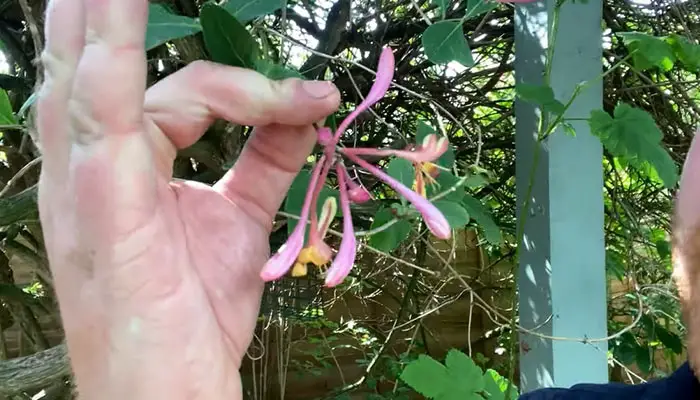
The best time to fertilize Honeysuckles is during its growing period which means early spring to onward. Most Honeysuckles variety blooms in spring and they need fertilization once or twice that time.
But if your Honeysuckles bloom all summer like Japanese Honeysuckles, you may have to fertilize them several times.
How to Fertilize Honeysuckle?
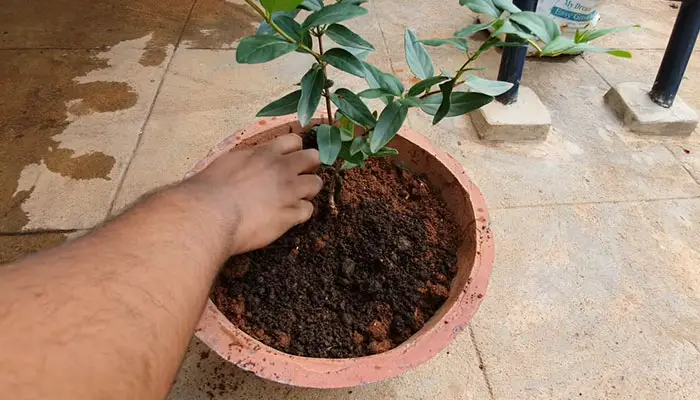
Fertilizing Honeysuckle is easy. Normally you have to provide fertilizer either in granular form or in mixed liquid form.
Granular Form
Before applying, prepare exact doses of fertilizer according to the label.
- For potted Honeysuckles, sprinkle the granules around the stem keeping a 3-4-inch distance from it.
- For inground supported Honeysuckles, try to figure out a drip line. I know it’s not easy but a tentative guess is quite fine. And then sprinkle the granules following the dripline.
In both cases, after applying the fertilizer, work on the soil slightly with a hand rake & then water thoroughly.
Liquid Form
For potted, inground supported or ground cover Honeysuckles-
- Mix the fertilizer with water according to the product label into a watering can or sprayer.
- You can either soil drench or spray according to the product direction. But foliar spraying to the indoor Honeysuckles is not recommended.
Frequently Asked Questions
Is bone meal good for honeysuckle?
Bone Meal is good for the blooming of Honeysuckles. Normally plant doctors recommend bonemeal when Honeysuckles stop blooming. You know, flowering plants require phosphorus to bloom & Bone Meal contains a high amount of phosphorus & other minerals like calcium, iron, magnesium, zinc, etc.
Is Miracle-Gro good for honeysuckle?
Both Miracle-Gro Water-soluble & Shake ‘N Feed fertilizer supplies at least 9-10 micro & macronutrients to your Honeysuckles. Moreover, Shake ‘N Feed offers a slow-release of Nitrogen for proper growth. So yes, you can use Miracle-Gro products. They are good & suitable.
Is tomato feed good for honeysuckle vines?
Tomato feed is good for Honeysuckles. Dr. Earth Tomato feed contains 6% phosphorus, 4% Nitrogen & 3% potassium & other nutrients. It also ensures the slow release of nitrogen. So, what else does your Honeysuckle need?
How do I get more flowers on my honeysuckle?
Getting more Honeysuckle bloom is not a one-way process. You have to provide proper fertilizer, ensure required sunlight & water, defend from pests & all other cares that honeysuckle needs
How do you take care of honeysuckle?
Apart from general care like watering, fertilizing & spraying pesticides, you have to be conscious about sunlight, mulching, pruning, adverse weather & such things. Most of the potted plants need repotting to avoid root-bound issues. And that is also a major concern.
Conclusion
You already know that Honeysuckles doesn’t have any specific needs for fertilization. And that leaves you in a dilemma picking the right fertilizer as almost all of them meet Honeysuckle’s needs.
However, I won’t lie to you. I have tried my best to narrow the list as much as I can & finally I have come up with these best fertilizers for your Honeysuckles.
I hope my review helps you to choose the right one for the Honeysuckles. Eager to see them bloom. All the best.
